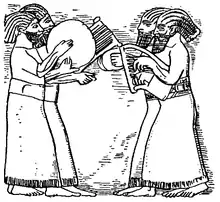Janan Sawa
Janan Sawa (born 1956 in Dohuk, Iraq) (Syriac: ܔܢܐܢ ܒܒܐ ܣܒ݂ܐ) is an Chaldean musician who is noted for making Chaldean folk dance.Janan started singing in 1972, at the age of 17. Janan has performed throughout the world, and has visited his hometown of Duhok in Iraqi Kurdistan (or the Chaldean homeland) on many occasions.
Janan Sawa | |
|---|---|
 Janan Sawa in 2006 | |
| Background information | |
| Birth name | Janan Sawa |
| Born | 1956 (age 64–65) Dohuk, Iraq |
| Origin | Dohuk, Iraq |
| Genres | Syriac folk music |
| Years active | 1985–present |
Biography
In 1975, Janan's father forced him to marry. He spent 4 years in the Iraqi army, from 1974 to 1978. In 1980, Janan fled Iraq and settled in Greece for 2 years. He finally left for the United States in 1982, where he remains a resident. After arriving in the U.S., Janan worked as a taxicab driver for 2 years. In 1984, he was hired by a restaurant to sing on a nightly basis. In 1985, he recorded his first studio album, named "Nohadra", the Assyrian name for his hometown, Dohuk. The album ultimately established his professional singing career, and until this date Janan has released over 25 albums and recorded close to 200 songs.
During his time in Dohuk, Janan would sing on regular occasions such as picnics and family events. Janan has also appeared and performed live on music television programs in Iraqi Kurdistan.
Style
Janan's musical style is influenced mainly by Assyrian/Syriac Folk and Kurdish. Janan can also perform fluently in Kurdish, due to him being born in the Kurdish-speaking Duhok.
Personal life
Janan has married once and has since been divorced. He has two daughters with his ex-wife. He got engaged in 2018 and he currently resides in Michigan. His brother, Esam Sawa, is also a singer.[1]
Discography
- 1985 - Nohadra
- 1986 - Tamboree
- 1986 - Zamareh
- 1987 - Yema
- 1988 - Sayada
- 1989 - Jwanka D'Hakkari
- 1990 - Lawando
- 1991 - Kirkuk
- 1992 - Ana Ewan Beth Nahrin
- 1993 - Zowaa
- 1994 - Kha B'Nisan
- 1995 - Shara D'Ninwahyeh
- 1996 - Mix of Janan Sawa
- 1997 - Nahrin
- 1998 - Broony
- 2001 - Shtwaher Ya Yema
- 2002 - Bderen L'Nohadra
- 2002 - Lenwa Ana
- 2004 - Qinate Min Atra
- 2005 - Hekle Tlekhe
- 2006 - Zorna Dahola
- 2006 - Kholma Sharira
- 2008 - Ishtar
- 2011 - Zamrin B'Khobakh
- 2012 - Atta
- 2013 - Bayenna

